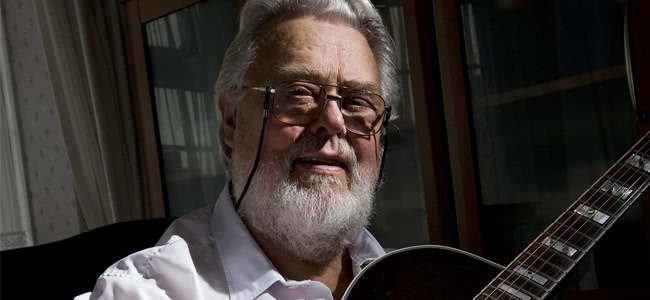James Tomkins, the influential guitarist best known as Big Jim Sullivan, has died at the age of 71.
If you don’t recognise Sullivan’s name, chances are you’ve heard still heard his playing and not even known it; having worked with a long list of artists, featured on an exhaustive list of #1 singles and played on a number of famous recordings such as Petula Clark’s ‘Downtown’ and Shirley Bassey’s Bond classic, ‘Goldfinger’.
Sullivan was one of the most sought after session musicians in the 60s and 70s and has had a long and accomplished career, starting in 1959, when he was hired by British singer-songwriter Marty Wilde to join his backing band, The Wildcats before he was later made the house guitarist on iconic TV shows Top Of The Pops and Ready Steady Go, where he began building his enviable list of musical friends and connections.
Along his career he also worked with the likes of George Harrison, Frank Zappa, Alivin Stardust and the Tremeloes, just to name a few. Sullivan is also credited with essentially teaching Steve Howe, of Yes and Asia fame, how to play as well as Deep Purple’s axeman, Ritchie Blackmore.
“Big Jim was a big influence,” Blackmore has said previously. “He’d only been playing about two years, but he was just about the best guitarist in England, straight away. I thought I was alright and learning pretty well. I couldn’t even understand what he was doing.”
It is Sullivan’s guitar playing that can be heard on at least 55 chart-topping hits, like Tom Jones ‘It’s Not Unusual’, Jane Birkin and Serge Gainsbourg’s sensual duet ‘Je t’aime… moi non plus’ and Peter Sarstedt’s “Where Do You Go To (My Lovely)” (as featured in the soundtrack to Wes Anderson’s The Darjeeling Limited)
The legendary guitarist is also regularly attributed with pioneering the use of the talkbox and fuzzbox in modern music, by the 1980s however, he had moved into film and television, helping write advertising jingles and film music.
As Classic Rock noted, Big Jim Sullivan recently said: “My whole life is geared to play guitar. I play what I want when I want – and I hope the listener gets as much pleasure as I get. I’m a very lucky man: I’m living my life with my hobby as my profession.”
Sullivan had been suffering from poor health for some time, and his widow Norma Tomkins, says that he died peacefully at their home in West Sussex last Tuesday.




































